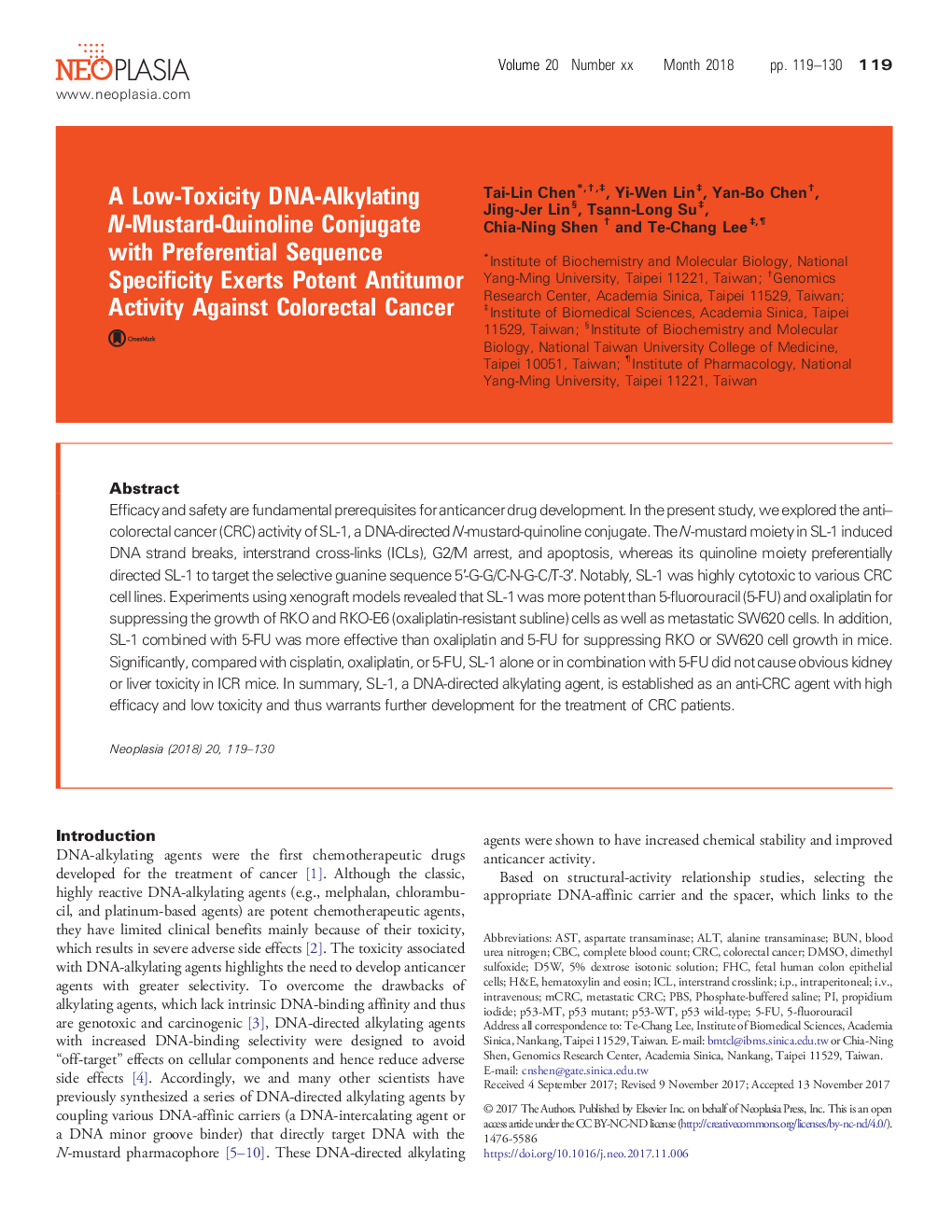| کد مقاله | کد نشریه | سال انتشار | مقاله انگلیسی | نسخه تمام متن |
|---|---|---|---|---|
| 8456839 | 1548779 | 2018 | 12 صفحه PDF | دانلود رایگان |
عنوان انگلیسی مقاله ISI
A Low-Toxicity DNA-Alkylating N-Mustard-Quinoline Conjugate with Preferential Sequence Specificity Exerts Potent Antitumor Activity Against Colorectal Cancer
دانلود مقاله + سفارش ترجمه
دانلود مقاله ISI انگلیسی
رایگان برای ایرانیان
کلمات کلیدی
i.p.p53 mutantFHCmCRCD5WICLCBCi.v.ALT5-FUPBSInterstrand crosslink - crosslink میانترندDMSO - DMSOH&E - H & EAST - آسپارتات ترانس آمینازalanine transaminase - آلانین ترانس آمینازaspartate transaminase - ترانس آمیناز آسپارتاتBUN - خوبintraperitoneal - داخل صفاقیIntravenous - داخل وریدیDimethyl sulfoxide - دیمتیل سولفواکسیدColorectal cancer - سرطان روده بزرگcomplete blood count - شمارش کامل خون5-fluorouracil - فلوروراسیل-۵، فلوئورواوراسیلPhosphate-buffered saline - محلول نمک فسفات با خاصیت بافریblood urea nitrogen - نیتروژن اوره خونHematoxylin and Eosin - هماتوکسیلین و ائوزینPropidium iodide - پروتئین یدیدCRC - کد افزونگی دورهای
موضوعات مرتبط
علوم زیستی و بیوفناوری
بیوشیمی، ژنتیک و زیست شناسی مولکولی
تحقیقات سرطان
پیش نمایش صفحه اول مقاله

چکیده انگلیسی
Efficacy and safety are fundamental prerequisites for anticancer drug development. In the present study, we explored the anti-colorectal cancer (CRC) activity of SL-1, a DNA-directed N-mustard-quinoline conjugate. The N-mustard moiety in SL-1 induced DNA strand breaks, interstrand cross-links (ICLs), G2/M arrest, and apoptosis, whereas its quinoline moiety preferentially directed SL-1 to target the selective guanine sequence 5â²-G-G/C-N-G-C/T-3â². Notably, SL-1 was highly cytotoxic to various CRC cell lines. Experiments using xenograft models revealed that SL-1 was more potent than 5-fluorouracil (5-FU) and oxaliplatin for suppressing the growth of RKO and RKO-E6 (oxaliplatin-resistant subline) cells as well as metastatic SW620 cells. In addition, SL-1 combined with 5-FU was more effective than oxaliplatin and 5-FU for suppressing RKO or SW620 cell growth in mice. Significantly, compared with cisplatin, oxaliplatin, or 5-FU, SL-1 alone or in combination with 5-FU did not cause obvious kidney or liver toxicity in ICR mice. In summary, SL-1, a DNA-directed alkylating agent, is established as an anti-CRC agent with high efficacy and low toxicity and thus warrants further development for the treatment of CRC patients.
ناشر
Database: Elsevier - ScienceDirect (ساینس دایرکت)
Journal: Neoplasia - Volume 20, Issue 2, February 2018, Pages 119-130
Journal: Neoplasia - Volume 20, Issue 2, February 2018, Pages 119-130
نویسندگان
Tai-Lin Chen, Yi-Wen Lin, Yan-Bo Chen, Jing-Jer Lin, Tsann-Long Su, Chia-Ning Shen, Te-Chang Lee,